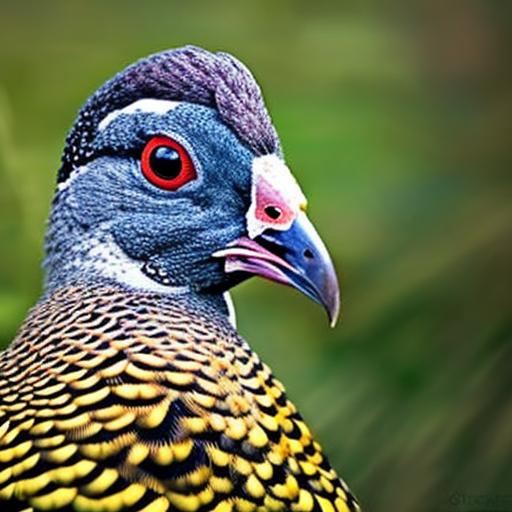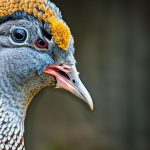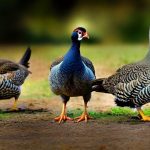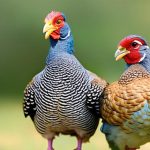Guinea fowl, also known as pintades, are a unique and fascinating addition to any farm or homestead. These birds are native to Africa but have been domesticated and are now found in many parts of the world. They are known for their distinctive appearance, with speckled feathers and a helmet-like crest on their heads. Guinea fowl are popular for their pest control abilities, as they are excellent at foraging for insects and other pests. They are also valued for their flavorful meat and eggs, making them a versatile addition to any farm.
Guinea fowl are relatively low-maintenance birds, making them a great choice for both experienced and novice poultry keepers. They are hardy and adaptable, able to thrive in a variety of climates and environments. While they can be a bit noisy, their unique calls and vocalizations add to the charm of keeping these birds. Whether you are interested in raising guinea fowl for pest control, meat, eggs, or simply as an interesting addition to your farm or homestead, there are a few key considerations to keep in mind when it comes to housing, feeding, health management, breeding, and understanding their behavior and social needs.
Key Takeaways
- Guinea fowl are low-maintenance birds that are great for pest control and can be kept as pets or for farming.
- Guinea fowl require a secure and spacious enclosure to protect them from predators and provide them with enough space to roam and forage.
- Guinea fowl have specific dietary needs and require a balanced diet of commercial feed, grains, and access to insects and greens for optimal health.
- Regular health checks, vaccinations, and proper hygiene are essential for preventing diseases and maintaining the well-being of guinea fowl.
- Breeding guinea fowl requires careful selection of breeding pairs, proper nesting areas, and monitoring of the incubation process to ensure successful reproduction.
Housing and Enclosure Requirements for Guinea Fowl
When it comes to housing guinea fowl, it’s important to provide them with a secure and spacious enclosure that allows them to exhibit their natural behaviors. Guinea fowl are highly active birds that enjoy foraging and exploring, so providing them with plenty of space to roam is essential. A large outdoor enclosure with access to grassy areas and open space is ideal for guinea fowl. The enclosure should be securely fenced to protect the birds from predators and should also have a sheltered area where they can roost at night and seek refuge from the elements.
In addition to outdoor space, guinea fowl also require a well-ventilated coop or shelter where they can roost at night and lay their eggs. The coop should be spacious enough to accommodate the number of birds in your flock and should provide protection from extreme weather conditions. Nesting boxes should be provided for egg-laying, and the coop should be kept clean and dry to prevent the buildup of bacteria and parasites. It’s important to regularly inspect the enclosure for any signs of wear or damage and make any necessary repairs to ensure the safety and security of your guinea fowl.
Feeding and Nutrition for Guinea Fowl
Guinea fowl are omnivorous birds that have a varied diet consisting of insects, seeds, grains, and vegetation. In a free-range setting, guinea fowl will spend much of their time foraging for insects and other small creatures, making them excellent natural pest controllers. However, it’s important to supplement their diet with a balanced commercial feed to ensure they are receiving all the essential nutrients they need. A high-quality game bird or poultry feed is suitable for guinea fowl and should be provided in addition to their foraged diet.
In addition to commercial feed, guinea fowl can also be offered treats such as fruits, vegetables, and mealworms as a supplement to their diet. It’s important to provide access to fresh, clean water at all times, especially during hot weather or when the birds are laying eggs. It’s also important to monitor the condition of your guinea fowl to ensure they are maintaining a healthy weight and condition. Adjustments to their diet may be necessary based on factors such as age, activity level, and seasonal changes in their environment.
Health and Disease Management for Guinea Fowl
Maintaining the health and well-being of your guinea fowl is essential for their long-term care and productivity. Like all poultry, guinea fowl are susceptible to a variety of diseases and health issues that can impact their overall health and productivity. Regular health checks and observation of your flock are important for early detection of any potential health concerns. It’s important to work with a veterinarian who is knowledgeable about poultry health to establish a preventative health care plan for your guinea fowl.
Common health issues that can affect guinea fowl include respiratory infections, parasites, and nutritional deficiencies. Providing a clean and dry living environment, regular deworming, and a balanced diet are important preventative measures that can help reduce the risk of these health issues. It’s also important to quarantine any new birds before introducing them to your existing flock to prevent the spread of disease. In addition to preventative measures, it’s important to have a plan in place for addressing any health concerns that may arise, including access to veterinary care when needed.
Breeding and Reproduction of Guinea Fowl
Breeding guinea fowl can be a rewarding experience for poultry keepers interested in expanding their flock or raising guinea fowl for meat or egg production. Guinea fowl are seasonal layers, typically laying eggs in the spring and summer months. When it comes to breeding guinea fowl, it’s important to provide them with a suitable nesting area where they can lay and incubate their eggs. Guinea fowl hens are known for being secretive about their nesting habits, often choosing secluded spots in the environment to lay their eggs.
Once the eggs are laid, they can be collected for incubation or left with the hen for natural incubation. Incubating guinea fowl eggs requires specific temperature and humidity conditions, so it’s important to have a reliable incubator or broody hen available for hatching. Guinea fowl chicks are relatively independent from a young age and can be raised alongside other poultry species such as chickens or ducks. It’s important to provide them with a warm and secure brooding area until they are old enough to join the rest of the flock. Breeding guinea fowl requires careful planning and attention to the specific needs of these birds during the breeding and hatching process.
Behavior and Social Needs of Guinea Fowl
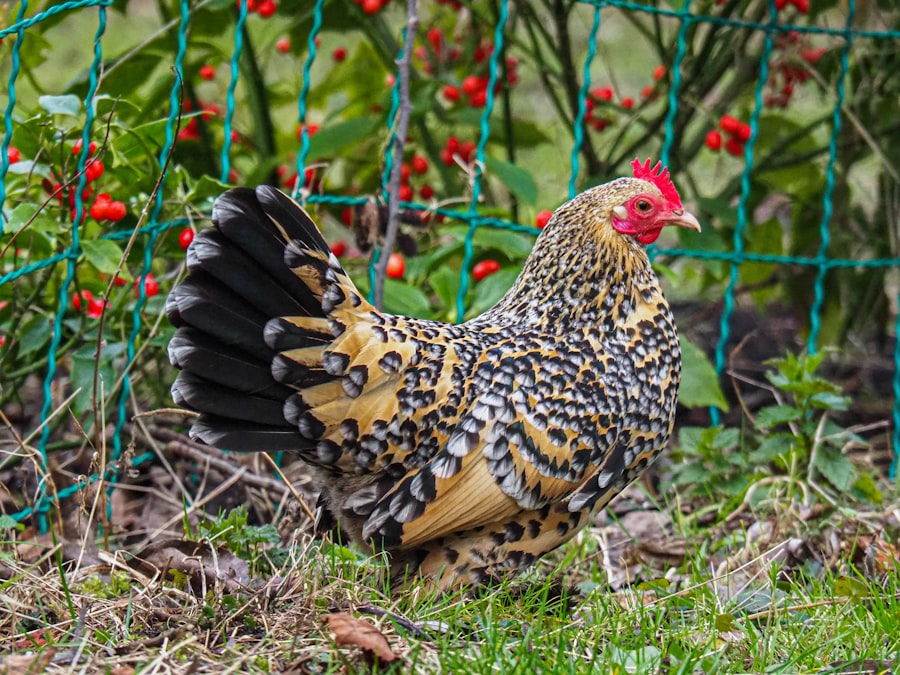
Guinea fowl are social birds that thrive in the company of their own kind. They are known for their strong flocking instincts and will often form close-knit groups within a larger flock. When keeping guinea fowl, it’s important to provide them with plenty of space to roam and exhibit their natural behaviors. They are highly active birds that enjoy foraging for insects and exploring their environment. Providing them with access to a large outdoor enclosure with plenty of grassy areas and open space is essential for meeting their social and behavioral needs.
Guinea fowl are also known for being vigilant and vocal birds that will alert the flock to potential threats or disturbances in their environment. While this behavior can be beneficial for predator detection, it can also make them noisy neighbors in some settings. Understanding the natural behaviors of guinea fowl is important for successfully keeping them in a farm or homestead setting. Providing them with an environment that allows them to exhibit their natural behaviors while also managing any potential noise concerns is key to ensuring their well-being.
Tips for Successfully Keeping Guinea Fowl as Pets or for Farming
Successfully keeping guinea fowl as pets or for farming requires careful consideration of their housing, feeding, health management, breeding, and behavioral needs. Providing them with a secure and spacious enclosure that allows them to roam and exhibit their natural behaviors is essential for their well-being. Additionally, ensuring they have access to a balanced diet that meets their nutritional needs is important for maintaining their health and productivity.
Regular health checks and preventative measures such as deworming are important for managing potential health concerns that can impact the overall well-being of your flock. When it comes to breeding guinea fowl, careful planning and attention to their specific needs during the breeding and hatching process is essential for success. Understanding the social behaviors of guinea fowl and providing them with an environment that allows them to exhibit their natural behaviors is important for keeping them content and healthy.
In conclusion, keeping guinea fowl can be a rewarding experience for both pet owners and farmers alike. These unique birds offer pest control benefits, flavorful meat, and eggs, making them a versatile addition to any farm or homestead. By understanding their specific housing, feeding, health management, breeding, and behavioral needs, you can successfully keep guinea fowl while ensuring their well-being and productivity. Whether you are interested in raising guinea fowl as pets or for farming purposes, careful consideration of their specific needs is essential for success.
Looking to keep your guinea fowl happy and healthy? Check out our related article on PoultryWizard.com that discusses the importance of providing a suitable environment for your poultry. Learn about the essential elements of a farmhouse chicken coop and how it can benefit your guinea fowl’s well-being. Click here to read more: Farmhouse Chicken Coop.
FAQs
What are guinea fowl?
Guinea fowl are a type of bird that are native to Africa. They are known for their distinctive spotted feathers and loud, chattering calls.
What do guinea fowl eat?
Guinea fowl are omnivores and eat a variety of foods including insects, seeds, and small fruits. They are also known to forage for food on the ground.
What are the benefits of keeping guinea fowl?
Guinea fowl are often kept for pest control, as they eat insects and can help to reduce the population of pests in a garden or farm. They are also known for their alertness and can act as a natural alarm system, alerting owners to the presence of predators.
How do you care for guinea fowl?
Guinea fowl require a secure coop or shelter to protect them from predators, as well as access to a large outdoor area for foraging. They also need access to fresh water and a balanced diet to stay healthy.
Are guinea fowl noisy?
Yes, guinea fowl are known for their loud calls and can be noisy, especially when they feel threatened or are trying to communicate with each other.
Meet Walter, the feathered-friend fanatic of Florida! Nestled in the sunshine state, Walter struts through life with his feathered companions, clucking his way to happiness. With a coop that’s fancier than a five-star hotel, he’s the Don Juan of the chicken world. When he’s not teaching his hens to do the cha-cha, you’ll find him in a heated debate with his prized rooster, Sir Clucks-a-Lot. Walter’s poultry passion is no yolk; he’s the sunny-side-up guy you never knew you needed in your flock of friends!

